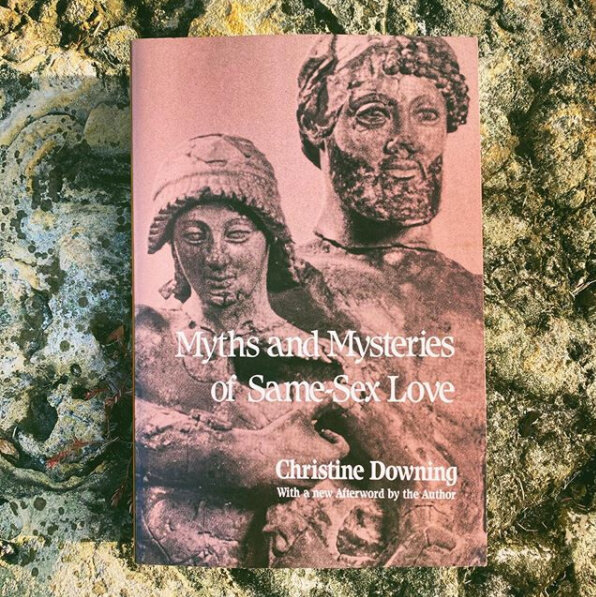Myths and Mysteries of Same-Sex Love
Myths and Mysteries of Same-Sex Love by Christine Downing
In honor of Pride 🏳️🌈 month, and 2020, it seems especially important for me to post this book now. This is for those like myself who have taken to analytical work, but who also pose big questions that have long haunted the field of psychology.
How does Depth Psychology approach LGBTQAI+ issues?
While there have been many contemporary discourses published, this classic stands as the most explosive, and perhaps the first to address #CarlJung’s pitfalls when it comes to contra-sexuality and our inner opposites. My beloved professor, Dr. Christine Downing, Pacifica Graduate’s darling lesbian crone, both smashes and tenderly revises the patriarchal undertows of the psychoanalytic understanding of what it means to identify outside the constructs of heteronormativity. While the theorizing has long been halted, there is still much work to do in revising a work that is well-worth reclaiming in all its splendor and depth.
Depth Psychology strongly advocates for the return of this sacred love to the gods, where it can be embraced as the integral, natural part of our humanity, and its development, that it has always been! Eros is not exclusive, as Freud said, at some point along the way, we are all bisexual beings.
Excerpt from Myths and Mysteries of Same-Sex Love by Christine Downing:
While Jung was notably hung up on the concept of the contrasexual archetype, the notion that homosexuality might express much meaning emerges from a way of looking taught to us by Jung. Marie Louise Von Franz said that both Freud and Jung were gripped by the same mythological theme: the phallic god… Freud says that we all have those desires and fears. Jung says that what the homosexual really wants is what we all want—to be whole, to be free of the inner split between feminine and masculine, to love and be loved, to reaffirm the connection between body and soul. That archetypal psychology need not perpetuate a contrasexual bias has been suggested by many Jungian theorists. Melvin Kettner acknowledges the relevance of the homosexual male’s “quest for the secret of the masculine principle” to a culture like ours where the inherited canon of the masculine ideal has come to seem outmoded. He sees homosexuality as a kind of mystery cult that may be part of our culture’s necessary return to a reaffirmation of the feminine and a consequent redefinition of the masculine, which would recognize it as complementary to, rather than suppressive of, the feminine. Thus a recognition of a progressive rather than, as previously posited, regressive aspect. The movement as a whole “reveals a compensatory phenomenon in the collective psyche which could lead to a reshuffling of the cultural standards for the ideal man or woman and thus could achieve a better harmony or balance…”
James Hillman sees Jung’s and Kettner’s tendency to posit a close association between homosexuality and a mother-complex as an example of a “bewitchment by the fantasy of opposites.” Although he doubts that we can imagine functionally beyond the physics of intrinsic oppositorum, he insists that “within it, however, our possibilities are limitless,” that we will discover that there are “ceaseless pairings and couplings” of anima, animus, ego and shadow, persona and self once we free ourselves of being locked into the contrasexual definition of anima and animus… Every archetype always implies another, but not always the same other. “Alchemy excels in exemplifying this development toward androgyny, interlocking terms, where each term shifts its valence according to the constellation. Thus anima can have all sorts of names and valences—polyvalent images—depending upon the tandem she is in. There are many different couplings and maturations of these archetypes, varying wildly with varying bodies, many different stories. Ultimately, it is a greater mediation of wholeness as humans to address our own desires freely as beautiful inner realities, necessary to psyche, rather than with misunderstandings and patriarchal theories.”
Books mentioned:
Myths and Mysteries of Same-Sex Love by Christine Downing


